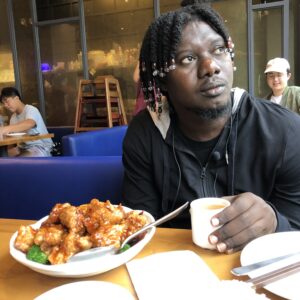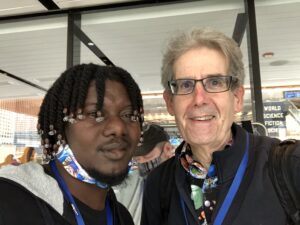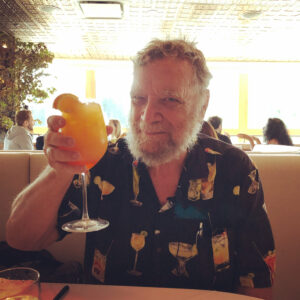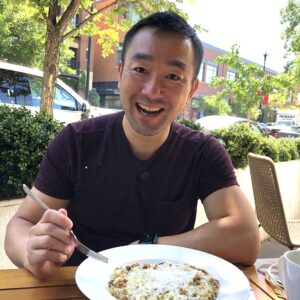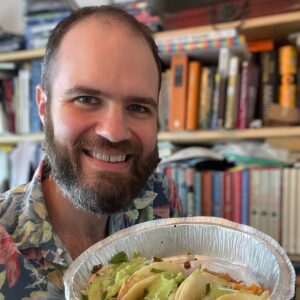Follow Scott
Recent Tweets
- Waiting for Twitter... Once Twitter is ready they will display my Tweets again.
Latest Photos
Search
Tags
anniversary Balticon birthdays Bryan Voltaggio Capclave comics Cons context-free comic book panel conventions DC Comics dreams Eating the Fantastic food garden horror Irene Vartanoff Len Wein Man v. Food Marie Severin Marvel Comics My Father my writing Nebula Awards Next restaurant obituaries old magazines Paris Review Readercon rejection slips San Diego Comic-Con Scarecrow science fiction Science Fiction Age Sharon Moody Stan Lee Stoker Awards StokerCon Superman ukulele Video Why Not Say What Happened Worldcon World Fantasy Convention World Horror Convention zombies
©2025 Scott Edelman
The first of two episodes recorded at the Baltimore Comic-Con — which is the last Eating the Fantastic episode of 2022 — was a bit like stepping into a time machine for me. That’s because guest Al Milgrom was the artist for my ’70s run on Captain Marvel, and therefore the co-creator of Dr. Minn-Erva, portrayed by Gemma Chan in the Captain Marvel movie. But Al’s so much more than Captain Marvel.
He edited The Incredible Hulk, drew The Avengers, and both wrote and drew Spectacular Spider-Man. During his early days in comics, he lived in the same Queens apartment building as Howard Chaykin, Walter Simonson, and Bernie Wrightson. His career at Marvel lasted far longer than mine, for he was the inker of X-Factor for eight years (1989–1997) and edited Marvel Fanfare for its full 10-year run (1982–1992). But his impact wasn’t limited to Marvel, as over at DC, he co-created Firestorm with previous guest of the podcast Gerry Conway. He also worked at nearly every existing comics company during his career, including Archie, Dark Horse, Image, Star Reach, Warren, and more.
We discussed our time working together on ’70s Captain Marvel, how he responded when Gerry Conway asked him to provide cover sketches for Jack Kirby, his memories of meeting Jim Starlin in middle school (and what Joe Orlando said about the duo when they brought their portfolios up to DC Comics), what he learned working as a backgrounder for the legendary Murphy Anderson, the day Marie Severin and Roy Thomas sent him on a wild motorcycle ride to track down Rich Buckler, how the artists on Marvel’s softball team always played better than the writers, why (and how) he works best under pressure, how he became a triple threat writer/artist/editor, the conflicting advice Joe Orlando gave him about his DC Comics covers, what not to talk about with Steve Ditko, how Jim Shooter got him to edit at Marvel, and much more.
Here’s how you can join us — (more…)
Dive into dim sum with Randee Dawn in Episode 187 of Eating the Fantastic
Posted by: Scott
Tags:
Capclave, Eating the Fantastic, Randee Dawn
Posted date:
December 16, 2022 |
No comment
This episode’s guest is Randee Dawn, whom I first met — in the flesh anyway — at last year’s D.C. Worldcon, where she impressed me by emceeing an entertaining afternoon of Fannish Pictionary in which I participated. After our paths crossed again during another round of Pictionary at the Chicago Worldcon, and I saw she’d also be at Maryland’s Capclave, I invited her to break bread with me there.
Our schedules were so tight the only time we had without a conflict was a Saturday morning breakfast. When Randee suggested we start the day with dim sum, we decided to head over to A & J Restaurant at 10:00 a.m. just as it opened.
Randee Dawn’s debut novel, the humorous pop culture fantasy Tune in Tomorrow, was released in August by Rebellion Publishing. She’s a former editor at The Hollywood Reporter and Soap Opera Digest, and these days covers show business for Variety, The Los Angeles Times, Emmy Magazine, and Today.com. Her short fiction has appeared in numerous anthologies and online publications such as Stories We Tell After Midnight, Even in the Grave, Another World: Stories of Portal Fantasy, and more.
She co-edited the anthology Across the Universe: Tales of Alternative Beatles. Her love of all things Law & Order led her to appear in one episode and later co-author The Law & Order: SVU Unofficial Companion. Once a month she hosts Rooftop Readings at Ample Hills Creamery in Brooklyn.
We discussed the way her soap opera and gaming backgrounds led to the creation of her fantasy debut novel Tune in Tomorrow, what made her decide it was time for her to write funny, why her first instinct is always to turn her ideas into novels rather than short stories, how Law & Order fan fiction conquered her fears of showing her writing to others (and eventually led to her appearing as extra on the franchise), the reason she doesn’t read her reviews, and much more.
Here’s how you can join us — (more…)
Bite into blood sausage with Tim Waggoner in Episode 186 of Eating the Fantastic
Posted by: Scott
Tags:
Eating the Fantastic, Tim Waggoner
Posted date:
December 2, 2022 |
No comment
You’ve taken a seat at the table with me for five culinary conversations during the 80th World Science Fiction Convention — Wesley Chu, Carol Tilley, Eileen Gunn, Michael Swanwick and Oghenechovwe Donald Ekpeki — but now it’s time for our Worldcon wandering to come to an end. I invite you to eavesdrop as I chat and chew with three-time Bram Stoker Award-winning writer Tim Waggoner
Tim Waggoner is a writer of dark fantasy and horror whose first short story was published in 1992 and first novel came out in 2001. Since then he’s published more than 50 novels and seven collections of short stories. He’s written tie-in fiction based on Supernatural, Grimm, The X-Files, Alien, Doctor Who, A Nightmare on Elm Street, and Transformers, and other franchises, and he’s written novelizations for films such as Halloween Kills, Resident Evil: The Final Chapter and Kingsman: The Golden Circle. His most recent original novel, We Will Rise, was published earlier this year.
He’s the author of the acclaimed horror-writing guide Writing in the Dark, which won the Bram Stoker Award in 2021. He won another Bram Stoker Award in 2021 in the category of short nonfiction for his article “Speaking of Horror,” and in 2017 he received the Bram Stoker Award in Long Fiction for his novella The Winter Box. In addition, he’s been a multiple finalist for the Shirley Jackson Award and the Scribe Award, and a one-time finalist for the Splatterpunk Award. In addition to writing, he’s also a full-time tenured professor who teaches creative writing and composition at Sinclair College in Dayton, Ohio.
We discussed whether being a horror writer gives him any special insights into the pandemic, the true meaning of his latest novel’s very specific dedication, the patience the writing life requires, what his agent doesn’t want him to let his editors know, the reason ghost stories have never struck him as scary, how to write about people unlike yourself and get it right, the unusual way he decided which characters would live and which would die, why Psycho was one of the best movie experiences he ever had, the most difficult thing a writing teacher can teach, and much more.
Here’s how you can join us — (more…)
Eavesdrop on Oghenechovwe Donald Ekpeki in Episode 185 of Eating the Fantastic
Posted by: Scott
Tags:
Eating the Fantastic, Oghenechovwe Donald Ekpeki
Posted date:
November 17, 2022 |
No comment
It’s time to take your seat at the table for the penultimate culinary conversation I’ll share from the 80th World Science Fiction Convention, following my chats there with Wesley Chu, Carol Tilley, Eileen Gunn, and Michael Swanwick. Now I invite you to join me at the table with the multi-award winning writer and editor Oghenechovwe Donald Ekpeki.
Ekpeki — who won the Best Novelette Nebula Award earlier this year for “O2 Arena” — was up for two Hugo Awards that weekend. Not only as a writer for “O2 Arena” again — but also in the category of Best Editor, Short Form. Plus earlier this month, he won a World Fantasy Award in the category of Best Anthology for The Year’s Best African Speculative Fiction. He has also won the Otherwise, Nommo and British Fantasy Awards, plus has been a finalist for the Locus, British Science Fiction Association, Theodore Sturgeon Memorial, and This Is Horror awards.
His fiction and nonfiction have appeared in or are forthcoming in Tordotcom, Apex Magazine, Strange Horizons, Asimov’s, Galaxy’s Edge, Cosmic Roots and Eldritch Shores, and more. In addition to editing that first ever — and now award-winning — Year’s Best African Speculative Fiction anthology, he also co-edited the award-winning Dominion: An Anthology of Speculative Fiction From Africa and the African Diaspora, as well as — most recently — the Africa Risen anthology from Tordotcom, co-edited with Sheree Renée Thomas and Zelda Knight.
We discussed the reason “shocked” seemed an inadequate word to describe his feelings about winning a Nebula Award earlier this year, what he considered the true prize he won over his Worldcon weekend, how growing up next to a library changed his life, how writing fan fiction helped him get where he is today, the way reading the struggles of a certain character in a Patrick Rothfuss novel helped him deal with his own struggles, what caused him to say “the law cannot help you change the law,” when he decided his novella “Ife-Iyoku, Tale of Imadeyunuagbon” deserved to be a trilogy, the way he does his best work when backed into a corner, how it’s possible for three editors to edit an anthology, and much more.
Here’s how you can join us — (more…)
Munch Carnitas Benedict with the award-winning Michael Swanwick in Episode 184 of Eating the Fantastic
Posted by: Scott
Tags:
Eating the Fantastic, Michael Swanwick
Posted date:
November 4, 2022 |
No comment
Out in the flesh and blood world, the 80th World Science Fiction Convention is long over, but here at Eating the Fantastic — where I’ve already invited you to eavesdrop on my meals there with Wesley Chu, Carol Tilley, and Eileen Gunn — it lives on. This time around, for the fourth of six culinary conversations I managed to find time for during a busy Worldcon, I invite you to join me for brunch with Michael Swanwick
Michael has won five Hugo Awards and three Locus Awards, as well as a Nebula, World Fantasy, and Theodore Sturgeon Memorial Award — plus has been nominated for and lost more of these major awards than any other writer. His novels include Vacuum Flowers, Stations of the Tide, and Bones of the Earth, plus his most recent, City Under the Stars, a novel co-authored with the late Gardner Dozois. He’s also published a baker’s dozen of short story collections over the past three decades, starting with Gravity’s Angels in 1991 and most recently Not So Much Said the Cat in 2016, as well as the 118 short stories included in The Periodic Table of Science Fiction, one per each element. His recent novel The Iron Dragon’s Mother completed a trilogy begun with The Iron Dragon’s Daughter in 1993, which was named a New York Times Notable Book. Two of his short stories — “Ice Age” and “The Very Pulse of the Machine” — were adapted for the Netflix series Love, Death + Robots.
We discussed his response to learning a reader of his was recently surprised to find out he was still alive, how J. R. R. Tolkien turned him into a writer, why it took him 15 years of trying to finally finish his first story, how Gardner Dozois and Jack Dann taught him how to write by taking apart one of his tales and putting it back together again, why it was good luck he lost his first two Nebula Awards the same year, the good advice William Gibson gave him which meant he never had to be anxious about awards again, which friend’s story was so good he wanted to throw his own typewriter out the window in a rage, the novel he abandoned writing because he found the protagonists morally repugnant, why he didn’t want to talk about Playboy magazine, the truth behind a famous John W. Campbell, Jr./Robert Heinlein anecdote, and much more.
Here’s how you can join us — (more…)
Dig into dim sum with the Nebula Award-winning Eileen Gunn in Episode 193 of Eating the Fantastic
Posted by: Scott
Tags:
Eating the Fantastic, Eileen Gunn, Worldcon
Posted date:
October 21, 2022 |
No comment
Welcome back to another culinary conversation from the 80th World Science Fiction Convention, where you’ve already joined me for brunch with Wesley Chu and lunch with Carol Tilley.
My guest this time around is Eileen Gunn, who received the Nebula Award in 2005 for “Coming to Terms,” a story inspired, in part, by her friendship with Avram Davidson, about whom she’s working on a biography. She also won Japan’s Sense of Gender Award, and has been nominated for the Hugo, Philip K. Dick, Locus, and Tiptree awards. Her short story collections include Stable Strategies and Others (2004), Questionable Practices (2014), and most recently Night Shift Plus … , out earlier this year as part of the PM Press Outspoken Authors Series. From 2001-2008, she was editor and publisher of the influential webzine The Infinite Matrix. She served for 22 years on the board of directors for Clarion West, and taught there and at numerous other creative writing workshops. She also had a lengthy career in technical advertising and website management in Boston, Seattle, and New York.
We discussed how it’s possible to write when you always have writers block, the Ursula K. Le Guin story which convinced her she could have a career in science fiction, the two most important things she wants aspiring writers to know, her early advertising career writing funny ads for shoes she didn’t like, the reason she believes “I don’t decide what the story is until after I’ve finished it,” which famous science fiction writer wrote the box copy for Screaming Yellow Zonkers, the question Kate Wilhelm asked her at Clarion which unlocked the unknown ending of a story in progress, the way her years in the ad business helped her become a better writer, how Carol Emshwiller made her a person of interest with a sheriff’s department, what she said on a Worldcon panel which was so outrageous the audience had to be told she was joking, how Psychology Day magazine was almost sued over Frankenstein because they didn’t listen listen to my advice, and much more.
Here’s how you can join us at Chicago’s MingHin cuisine — (more…)
It’s time to head back to Chicago for the second of six episodes recorded over the Labor Day weekend at the 80th World Science Fiction Convention, following Episode 181’s brunch chat with Wesley Chu.
This episode’s guest is Carol Tilley, a professor in the School of Information Sciences at the University of Illinois who teaches and writes about comics, libraries, reading, and censorship. We first met six years ago when she was in D.C. to deliver a presentation at the National Archives titled “Dear Sirs: I Believe You’re Wasting Your Time,” during which she shared what she learned about comics readers of the ‘50s while researching the records of the Senate Judiciary Committee’s Subcommittee on Juvenile Delinquency. In her role as a comics historian, she’s made numerous visits to D.C. over the years to research at the Library of Congress and National Archives for a biography of Fredric Wertham, whose attacks on sex and violence in comics, and particularly his infamous book Seduction the Innocent, helped bring about the Comics Code.
She was interested not just in the inner workings of Wertham — who comics fans, when I first entered fandom, considered a bigger villain than Doctor Octopus and Lex Luthor rolled into one — but also in the experiences of those who read, drew, and engaged with comics in the US during the ’30s-’50s. She came to Worldcon to share what’s she’s learned, and was also going to speak on a panel about the renewed attack on books and curriculum in schools across the U.S.
We discussed how we each first learned about the Comics Code, the mostly forgotten rich kid origins of Blondie‘s Dagwood Bumstead, the unsettling inconsistencies she discovered while going through 200 boxes of Fredric Wertham’s papers, what those documents reveal about how he came to believe what he came to believe, what it means to research with the brain of an historian, the proper pronunciations of Potrzebie and Mxyzptlk, her efforts to track down those who wrote letters to the Senate protesting comic book censorship during the ’50s (including one of the founders of the Firesign Theater), the enduring power of EC’s “Judgment Day,” why she believed comic book censorship would have occurred even without Wertham’s input, what she thinks he’d make of today’s comics, how Wertham felt about the way comic book fans felt about him, and much more.
The setting for this episode was The Purple Pig, a restaurant I hadn’t been to since the last time Worldcon was in Chicago, way back in 2012.
Here’s how you can join us there — (more…)
Chow down with Wesley Chu in Episode 181 of Eating the Fantastic
Posted by: Scott
Tags:
Eating the Fantastic, Wesley Chu
Posted date:
September 23, 2022 |
No comment
The 80th World Science Fiction Convention ended a few weeks ago out in the flesh-and-blood world, but here at Eating the Fantastic, it’s just beginning — because you’re about to join me for the first of six episodes recorded in Chicago over the Labor Day weekend. We begin by heading out with writer Wesley Chu to Summer House Santa Monica, a favorite brunch spot of his from the days when he lived in Chicago.
Chu’s debut novel, The Lives of Tao, earned him a Young Adult Library Services Association Alex Award and a Science Fiction Goodreads Choice Award Top 10 slot, and was followed by three other books in that universe — The Deaths of Tao (also in 2013), The Rebirths of Tao (2015), and The Days of Tao (2016). He’s also published two books in his Time Salvager series — Time Salvager (2015) and Time Siege (2016). His novel Typhoon, set in The Walking Dead universe, was published in 2019.
He’s also the coauthor of the Eldest Curses series with Cassandra Clare, the first book of which — The Red Scrolls of Magic (2019) — debuted at #1 on the New York Times bestseller list, and was followed by The Lost Book of the White in 2020. His latest novel, The Art of Prophecy (2022), released in August, is the first book in The War Arts Saga. He was a finalist for the John W. Campbell Award for Best New Writer in 2014, and won the following year. But that’s not all! He’s also an accomplished martial artist and a former member of the Screen Actors Guild who has acted in film and television, worked as a model and stuntman, and summited Kilimanjaro.
We discussed why his new novel The Art of Prophecy has him feeling as if he’s making his debut all over again, the reason his particular set of skills means he’s the only one who could have written this project, why creating a novel is like trying to solve a 1,000-piece jigsaw puzzle without the picture on the box as reference, the heavy lifting a well-written fight scene needs to accomplish, why you’ll never get to read his 180,000-word first novel, how to make readers continue to care when writing from the POV of multiple characters, the benefits and pitfalls of writing bigger books, why he decided to toss 80,000 words from the second book in his series, the ways in which environments are also characters, and much more.
Here’s how you can join us — (more…)
Meet Max Gladstone for a Mexican meal in Episode 180 of Eating the Fantastic
Posted by: Scott
Tags:
Eating the Fantastic, Max Gladstone
Posted date:
September 9, 2022 |
No comment
I’m just back from the 80th World Science Fiction Convention — and I suppose I should point out it wasn’t my 80th Worldcon. Though I’ve been attending cons since I was 15, I’m not that old. Chicon 8 was merely — merely! — my 36th.
And I’ve brought back conversations for you with Wesley Chu, Carol Tilley, Eileen Gunn, Michael Swanwick, Oghenechovwe Donald Ekpeki, and Tim Waggoner. But what I haven’t brought back — at least as of this morning — is a case of COVID-19. Which as far as I’m concerned is a miracle, considering my anxiety levels going into the con.
But before we get to any of those six conversations, I’d like you have lunch with Max Gladstone. Max is perhaps best-known for his Craft Sequence of fantasy novels which began in 2012 with Three Parts Dead, continued in 2013 with Two Serpents Rise, and so far consists of six volumes, which considered as a whole were nominated for a Best Series Hugo Award. His interactive projects include the Choice of the Deathless and Deathless: The City’s Thirst, which both take place in the world of the Craft Sequence. With previous guest of the podcast Amal El-Mohtar, he wrote the internationally bestselling This is How You Lose the Time War, which was published in 2020 and won the Hugo, Nebula, and Ignyte Awards. Gladstone also created the Serial Box series Bookburners, and the interactive television series Wizard School Dropout. His most recent novel, Last Exit, was published in March.
We discussed what a Godzilla movie has to tell us about the way future art will likely deal with the pandemic, our differing ideas over what we mean when we say we’ve written another draft of a story, how we’d be willing to dispense with the art inspired by tragedy if we could only skip the tragedy as well, the differences between his early and final drafts of Last Exit, how to make us care equally when writing from multiple points of view (and how doing so could cause the reader to trust the writer even more), what it is about science fiction that attracts dystopias, how our dreams have changed due to COVID-19, what we get wrong when we write about civilizations lasting thousands of years, and much more.
Here’s how you can join us — (more…)
Join writer David Ebenbach for cheesecake in D.C. on Episode 179 of Eating the Fantastic
Posted by: Scott
Tags:
David Ebenbach, Eating the Fantastic
Posted date:
August 30, 2022 |
No comment
This episode’s conversation didn’t involve sneaking off from a convention — though it might have. That’s because I could have had lunch with David Ebenbach during Awesome Con as I did with previous guests of the show Patrick O’Leary and Sam J. Miller, but I didn’t see the point in trying to squeeze him into a busy weekend when he was a local writer and I was able to meet up with him any time. And so that’s what I did, heading into D.C. for lunch on the patio at the Glover Park Grill
David’s the author of eight books of fiction, poetry, and non-fiction, the most recent being his novel How to Mars, published last year by Tachyon Press, and the short story collection The Guy We Didn’t Invite to the Orgy and Other Stories, published in 2017 by the University of Massachusetts Press. His short stories have appeared in such genre markets as Asimov’s, Analog, and Not One of Us, but he’s also been published in such literary markets as the Kenyon Review, Iowa Review, and New England Review.
His writing has won him the Drue Heinz Literature Prize, the Juniper Prize, the Patricia Bibby Award, and other awards. He works at Georgetown University, teaching creative writing and literature at the Center for Jewish Civilization and creativity through the Masters in Learning, Design, and Technology Program, and promoting inclusive, student-centered teaching at the Center for New Designs in Learning and Scholarship.
We discussed the way he started writing science fiction without realizing he was writing science fiction, the final line of the worst thing he’s ever written, how his first scribbling as a kid was a violent spy novel about The Smurfs, why it’s important to root for an author and not merely our own reading experience, the cliches some in the literary and science fiction worlds believe about each other, the newspaper article which sparked his novel How to Mars, the way he’s managed to carve himself out a bifurcated writing life, the philosophical differences between those writing novels and short stories, and much more.
Here’s how you can join us — (more…)





